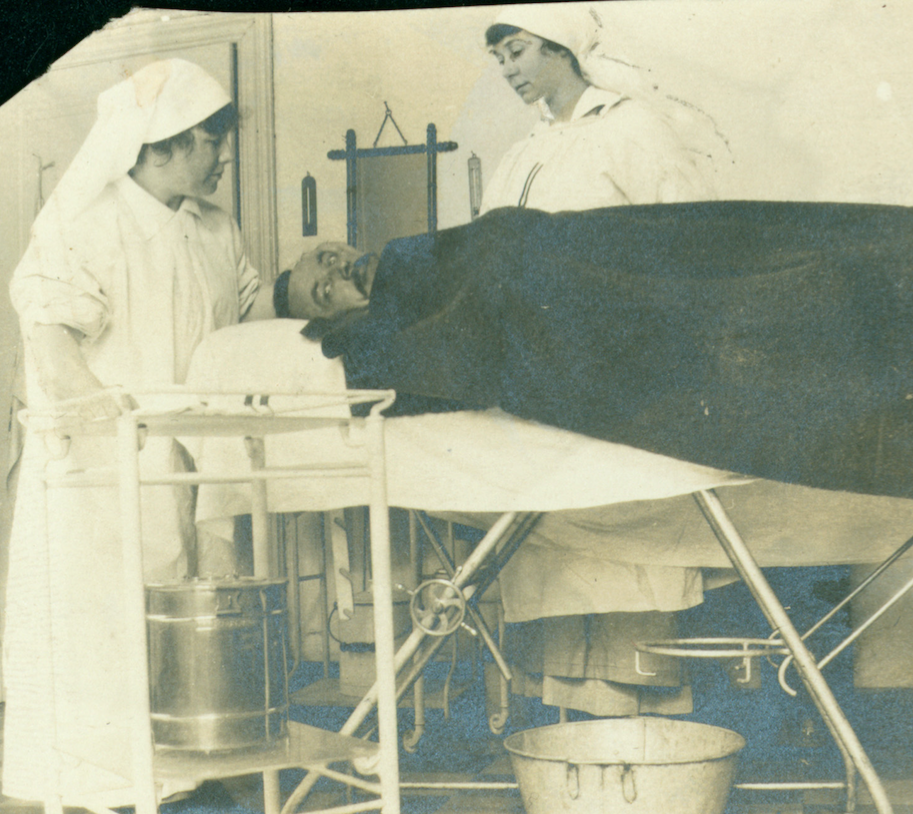Asheville’s first case of the epic 1918 influenza was reported on Sept. 28. Throughout the fall and winter, the number of infected city residents increased, totaling 4,477 cases and 127 deaths by February 1919. At the time, Asheville’s population was 30,000.
A year later, following a quiet spring and summer, the city prepared for another possible influenza outbreak. On Sept. 6, 1919, The Asheville Citizen reported that Dr. Carl V. Reynolds, the city health officer, was urging residents to take precautions. While there was no remedy for the virus, Reynolds implored all community members to get the pneumonia vaccine (as many of the previous year’s influenza-related deaths were caused by complications from the lung infection).
According to the Sept. 6 article, Reynolds told residents:
“I have no desire to frighten Asheville or to create any unnecessary alarm. But I do feel that the public should get a warning of the danger of failing to take steps to prevent a return of influenza here. The man who ‘takes a chance’ now by permitting himself and the other members of his family to disregard the opportunity to secure immunization against pneumonia will be, in my opinion, directly responsible for any deaths that may occur among his family group from influenza’s complications.”
On Sept. 20, 1919, The Asheville Citizen reported that the pneumonia vaccine was available to all city and county residents for free. Meanwhile, doctors were encouraged to treat every cold as a mild case of influenza.
In the following week’s Sunday Citizen — which marked the one-year anniversary of the city’s first 1918 influenza case — the paper published remarks by Reynolds delivered at a recent meeting of the State Medical Society. In it, the city health officer noted Asheville’s successes and failures during the previous year’s pandemic.
At the onset, Reynolds lamented, too many residents failed to report their symptoms. By Oct. 8, 1918, there were 115 new cases occurring each day, peaking at 212 reported cases on Oct. 19.
Reynolds thanked the Red Cross and complimented the city’s local officials for how they handled the crisis. But he directed his most lavish praise toward Asheville’s “noble women” who volunteered their “invaluable services in nursing the sick,” while jeopardizing their own lives.
By Oct. 27, 1918, their efforts paid off, Reynolds informed the State Medical Society: The total number of cases had dropped to 77. But as safety restrictions loosened, new cases emerged throughout the winter. (See “Asheville Archives: How wishful thinking helped spread the 1918 influenza,” April 21, Xpress)
“The history of previous epidemics teaches us that we may expect a reoccurrence of the disease,” Reynolds warned the medical group. “We should have laws making it a misdemeanor, not only for careless expectorating, but coughing and sneezing without taking proper precautions to protect those near by.”
Being a highly contagious and lethal disease with no known cure, Reynolds also stressed that fighting influenza required every citizen to be selfless. Too often, he proclaimed, “individual forgetfulness of … fellowman” drove people to fulfill their wants “at any cost, even risking self [health] and endangering others [so] that a selfish desire may be obtained.”
In the early days of autumn 1919, Asheville residents appeared to heed Reynolds’ calls. But as the winter arrived, the city’s fortune soon changed.
Editor’s notes: This is an ongoing series that examines the 1918 influenza. Previous articles can be read at the following links: avl.mx/73d, avl.mx/73e, avl.mx/73f and avl.mx/73g. Spelling and punctuation are preserved from the original documents.






Those who forget history are doomed to repeat it. Note which businesses are prematurely opening and take your business elsewhere when science and medicine tell us it is safer to go out again. These business owners and their customers have put a price on human lives and apparently marked them down for clearance… #ScienceMatters
Let me guess, you believe in “global warming” and that the 2-party system actually provides you with choices!?
Yes, I believe in climate change and that the two party system gives me choices, although increasingly they are lousy choices. If we were to do away with political parties and have an Open Primary system with a runoff between the top two vote getters we’d have better choices. (Or even ranked preference voting with instant run offs). Unfortunately science and medicine haven’t come up with a cure for voter stupidity…